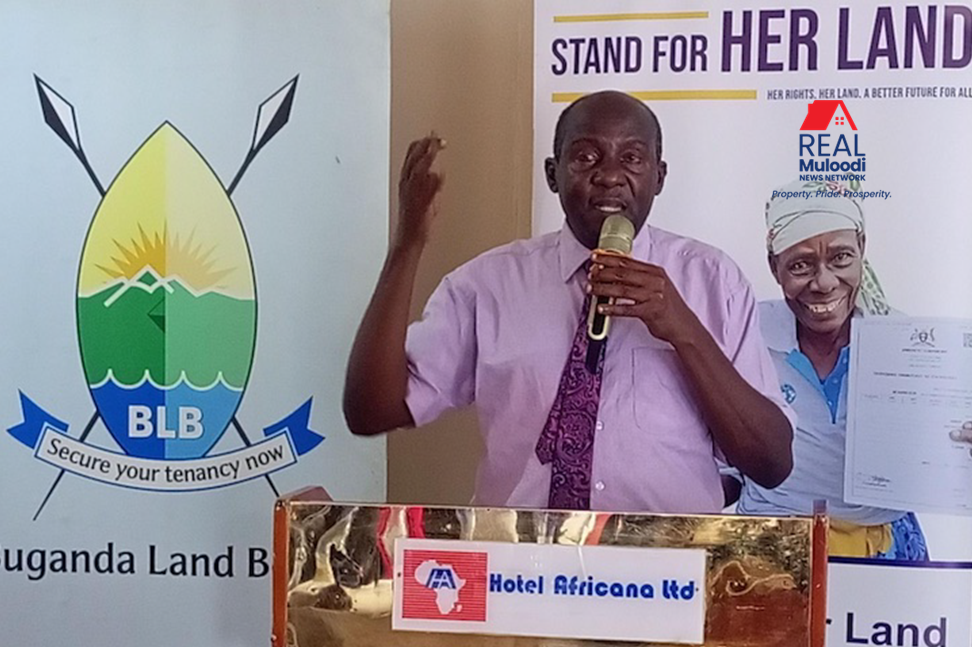UGANDA, Kampala | Real Muloodi News | The Lands Ministry has urged women to assert their rights by signing family land purchase agreements as co-owners rather than mere witnesses. This advice comes in response to numerous cases where women have faced eviction from family land because they only signed agreements as witnesses, not as co-owners.
Mr. Abdul-Nasser Olekwa, the Principal Lands Officer, and Mr. Dennis Obbo, the Principal Communications Officer in the Lands Ministry, emphasized the importance of this practice change during a dialogue organised by the Uganda Community-Based Association for Women and Children Welfare (UCOBAC) under the Stand For Her Land Campaign. This campaign aims to secure women’s land rights by bridging the gap between law and practice.
Mr. Obbo highlighted that women often contribute significantly to the purchase of family land, yet they typically sign agreements as “mere witnesses.” This practice permits their spouses to sell the land without their consent, especially during disagreements.
“Why do you allow signing as a mere witness when it is you who has worked hard to raise the money? Why should you allow your husband to invite you to sign as a mere witness when you have been married to him? Stop these statements and believe that a man is the family head. Have the power to question why you are signing as a mere witness,” Mr. Obbo stated.
Mr. Olekwa pointed out that cultural beliefs have perpetuated the injustices women face regarding land use and ownership.
He noted that these beliefs often dictate that women should be submissive to men and have no right to inherit property from their spouses or parents.
“Some of these beliefs are not true in cultural contexts but continue to affect women’s rights to land,” he said.
Ms Caroline Kayanja, UCOBAC’s Senior Programs Officer, added that while women are the majority users of land, men are the predominant owners.
She stressed that if women are merely land users without ownership rights, their existence and productivity on the land are at risk.
“We know land issues in this country affect both men and women, but they affect women more. We have invested a lot in revising land laws, but we need practical efforts to ensure they work for women. Women should not be mere recipients but beneficiaries of land laws,” Ms Kayanja said.
Participants in the dialogue called for land laws to be translated into local languages to ensure they are understood by ordinary people.
Ms Kayanja noted that women often lack basic knowledge about land ownership laws, making them more vulnerable to exploitation.
Several instances were cited where women faced difficulties due to their status as mere witnesses in land transactions.
One case involved a woman who was evicted from her home after her husband sold the land without her knowledge.
Such cases underscore the importance of women asserting their rights as co-owners to prevent future disputes and protect their investments.
According to data from the Uganda Bureau of Statistics, a significant percentage of land in Uganda is purchased with contributions from both spouses, yet only a fraction of women are listed as co-owners. This discrepancy highlights the need for policy changes and increased awareness.
“Women need to be aware of their rights and the importance of being recognised as co-owners of family land,” said Mr. Olekwa. “This change is crucial for ensuring their security and participation in land ownership.”
Ms. Kayanja added, “Translating land laws into local languages will empower women and other community members to understand and claim their rights effectively.”
A participant in the dialogue, Ms. Jane Namukasa, shared her experience: “I was unaware of the implications of signing as a witness. Now, I understand the importance of being a co-owner to protect my contributions and rights.”
The Stand For Her Land Campaign, spearheaded by UCOBAC, focuses on securing women’s land rights through education, advocacy, and legal reforms.
The campaign seeks to bridge the gap between existing laws and their implementation, ensuring that women can exercise their rights fully.
UCOBAC has been actively involved in community outreach programs, educating women about their land rights and the importance of legal documentation.
These programs aim to empower women to take proactive steps in securing their land ownership.
The Lands Ministry has pledged to support legislative reforms that promote gender equality in land ownership.
Mr. Obbo stated, “We are committed to working with lawmakers to ensure that land laws are inclusive and protect the rights of all citizens, especially women.”
The call by the Lands Ministry for women to sign family land purchase agreements as co-owners marks a significant step towards gender equality in land ownership.
By securing their rights as co-owners, women can protect their investments, prevent disputes, and contribute to the economic development of their communities.
The collaborative efforts of the Lands Ministry, UCOBAC, and the Stand For Her Land Campaign aim to create a more inclusive and equitable land ownership landscape in Uganda.
READ MORE LIKE THIS:



